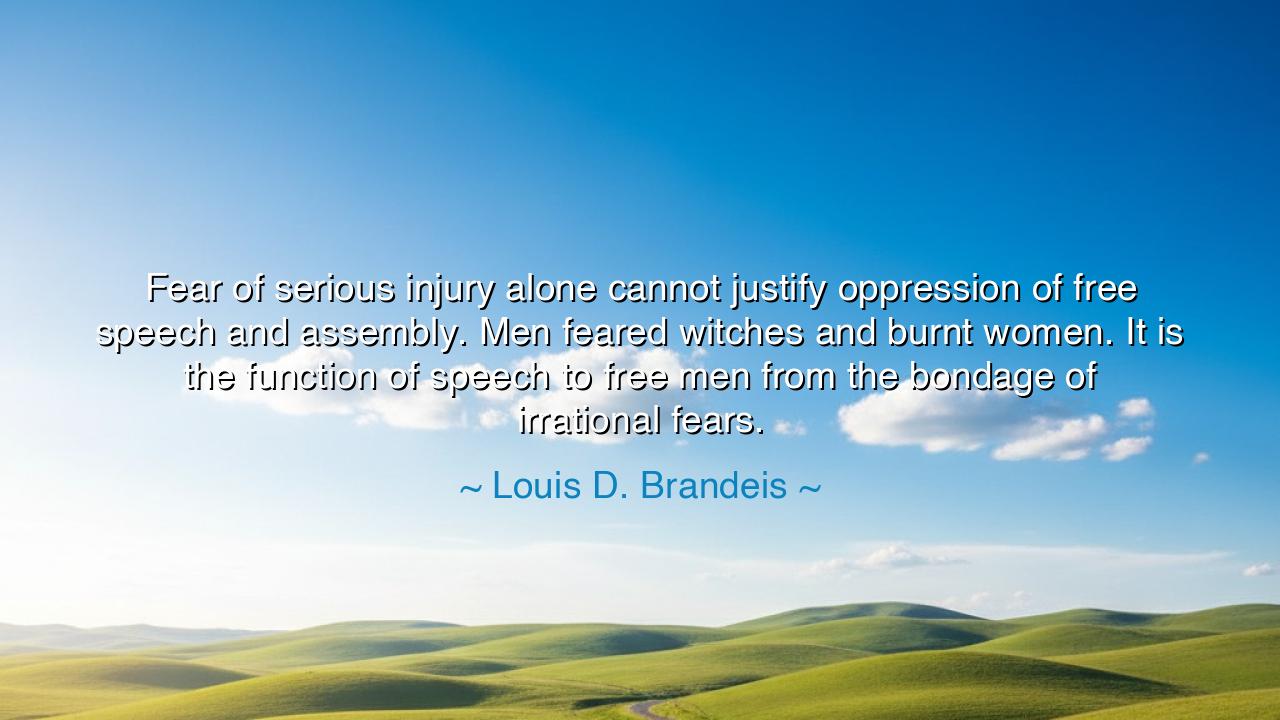
Fear of serious injury alone cannot justify oppression of free
Fear of serious injury alone cannot justify oppression of free speech and assembly. Men feared witches and burnt women. It is the function of speech to free men from the bondage of irrational fears.






In the solemn and piercing words of Louis D. Brandeis, the great jurist and defender of liberty, he wrote: “Fear of serious injury alone cannot justify oppression of free speech and assembly. Men feared witches and burnt women. It is the function of speech to free men from the bondage of irrational fears.” These words, drawn from his concurring opinion in the landmark U.S. Supreme Court case Whitney v. California (1927), stand as a beacon for all generations that cherish the fragile flame of freedom. They are not merely a defense of law, but a declaration of truth — that the cure for fear is not silence, but reason, and that the true purpose of speech is to lift humanity from the darkness of ignorance into the light of understanding.
When Brandeis speaks of the “fear of serious injury,” he names the oldest weapon of tyrants — fear itself. Governments, institutions, and even ordinary people often cloak oppression in the language of protection: “We must silence the voice that threatens our safety.” Yet history teaches that when fear is allowed to justify suppression, freedom perishes and folly reigns. Brandeis reminds us that fear, though powerful, is often blind — that men, in their terror of the unknown, have turned against the innocent. “Men feared witches and burnt women,” he wrote, evoking the madness of the witch trials, when superstition drowned out reason and hysteria became law. In that haunting image lies the eternal warning: when fear governs speech, truth itself is the first victim.
The origin of Brandeis’s words lies in his deep belief that democracy cannot survive without open discourse. In Whitney v. California, a woman named Charlotte Whitney had been convicted for helping organize a group accused of advocating radical political ideas. The Court upheld her conviction, yet Brandeis, joined by Justice Holmes, spoke with a higher vision — that the answer to dangerous ideas is not silence, but more speech. He understood that to suppress opinion is to breed ignorance, and that ignorance breeds fear — the same fear that once drove men to persecute those they did not understand. In his eyes, the function of free speech was not mere self-expression, but liberation — the emancipation of the human mind from irrational terror and unexamined belief.
History is filled with examples that reveal the truth of Brandeis’s warning. In the dark age of the Salem witch trials, fear turned neighbor against neighbor; in the McCarthy era, suspicion of communism silenced thousands of innocent voices. In both times, fear disguised itself as safety, and truth was sacrificed upon the altar of panic. Yet it was only through the courage of those who spoke out — those who challenged the frenzy — that reason was restored. Speech, in its purest form, is not merely sound; it is light. It burns away the fog of fear and reveals the reality beneath.
Brandeis believed that fear and ignorance are the twin chains that bind humanity, and that only courageous discourse can break them. Speech is not dangerous when it seeks truth — it becomes dangerous only when it is silenced. For in silence, fear festers, and the mind grows dark. To speak freely is to think freely, and to think freely is to be human. Thus, Brandeis teaches that liberty depends not merely on law, but on the moral courage of each citizen to speak, to listen, and to reason, even when the crowd demands silence.
Let this, then, be the lesson: never yield your voice to fear, and never allow fear to dictate who may speak. If you hear words that trouble you, do not call for their destruction; answer them with truth. If an idea threatens your comfort, meet it not with hatred, but with understanding. For every time speech is silenced in the name of safety, another witch burns, another truth dies, and another generation inherits the ashes of ignorance.
So, dear listener, remember Louis D. Brandeis’s eternal wisdom: fear cannot defend freedom — only courage can. Speech is not the enemy of safety, but its guardian. It is the means by which men rise from the bondage of irrational fears and learn to live as reasoning beings, not frightened children. Therefore, speak when it is dangerous, listen when it is difficult, and defend the right of others to do the same. For in the symphony of free voices lies the only true safeguard of civilization — the freedom of the mind, and the triumph of light over darkness.






AAdministratorAdministrator
Welcome, honored guests. Please leave a comment, we will respond soon